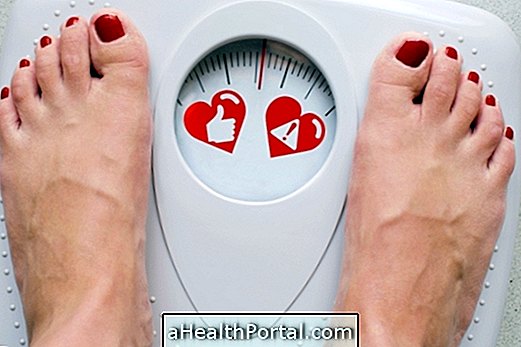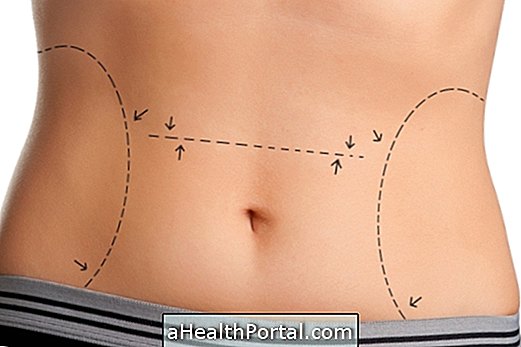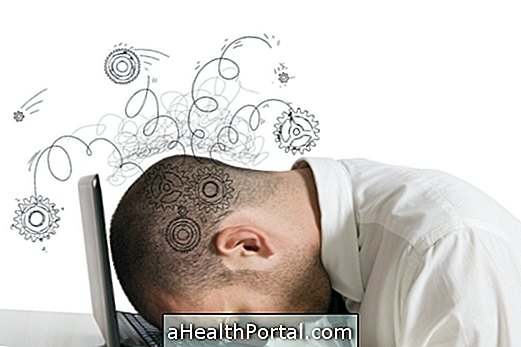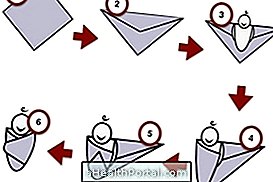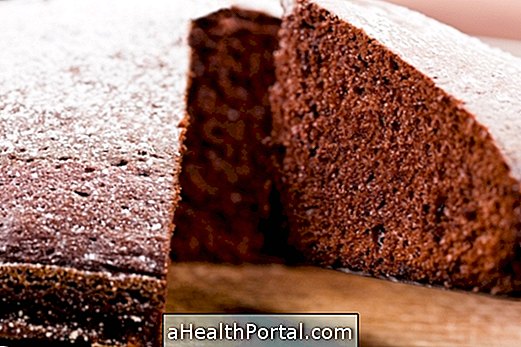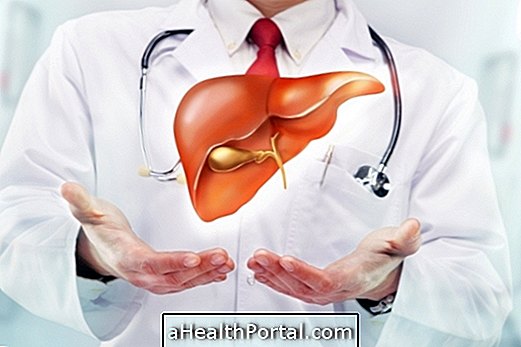Some of the main reasons for not being able to lose weight include not eating breakfast, sleeping a few hours and not practicing regular physical activity, as daily routines directly interfere with metabolism, the production of hormones such as cortisol and leptin, and the way the body burns calories and fats.
To lose weight you must spend more calories than you consume, so that the body uses the fat reserves as a form of energy to keep the cells functioning. In addition, physical activities favor the increase of muscle mass, which ends up increasing metabolism and accelerating the burning of fat cells.
To lose weight quickly and in a healthy way, the ideal is to consult an endocrinologist to make an assessment of the hormonal levels in the body, in addition to following a diet plan, guided by a nutritionist, and an exercise plan, indicated by a physical educator.

The main reasons why you can't lose weight are:
1. Don't eat breakfast
Breakfast is the most important meal of the day because during sleep the body does not stop consuming energy to keep the body functioning and after long hours of overnight fasting, you must replace the energies spent early in the morning.
By not eating breakfast, the body decreases the burning of fat to try to conserve energy, in addition to burning the muscles for energy, which slows down the metabolism and makes weight loss difficult.
What to do: breakfast should be eaten within one hour after waking up and include healthy foods such as fiber, fruit and protein. Check out healthy breakfast options to lose weight.
2. Eat lots of calories
One of the reasons for not being able to lose weight is not to control the amount of calories in the food and eat more calories than you spend, and this can happen even if you eat healthy, because many times, the person can eat more than the recommended amount .
What to do: the ideal is to follow up with a nutritionist individually, as the amount of calories that you should eat to lose weight depends on the basal metabolism of each person, which is calculated according to age, sex, height and weight.
Use the calculator to find out how many calories you burn each day:

3. Eat a lot before bed
Eating a lot before bed, in large quantities or very fatty foods that are difficult to digest, in addition to providing extra calories to the body, slows down the metabolism, making it harder to burn fats, being one of the reasons for not being able to lose weight .
What to do: you should have dinner at least 3 hours before bed or make a light snack easy to digest such as yogurt, gelatin or a fruit.
Watch the video with nutritionist Tatiana Zanin with tips on what to eat before bed:

4. Aging
Aging is another reason for not being able to lose weight and this is because, with age, the body starts to spend less energy to maintain its functions such as breathing, cell repair and food digestion.
In addition, normal hormonal changes in aging cause a gradual loss of muscle mass, which leads to a decrease in metabolism, as muscles expend more energy than fat cells.
What to do: take a thermogenic tea to accelerate the burning of calories and practice physical activities that help to tone and increase muscle mass, as they allow you to increase metabolism and lose weight. See more tips on how to speed up your metabolism to lose weight.
5. Do not sleep 8 to 9 hours a night
Not sleeping for 8 to 9 hours a night is another reason for not being able to lose weight because during sleep larger amounts of the hormones GH and leptin are produced, which stimulate the gain of muscle mass, which leads to increased metabolism and fat burning, in addition to promoting a greater feeling of satiety, leading the person to eat less and, thus, favor weight loss.
In addition, tiredness and the stress of not sleeping 8 to 9 hours a night not getting enough sleep, increase the levels of the hormone cortisol, making weight loss difficult.
What to do: create a sleep routine and wake up at the same time every day, guaranteeing 8 to 9 hours of sleep per night to help with weight loss.
Watch the video with tips on how to lose weight while sleeping:

6. Don't exercise regularly
One of the main reasons for not being able to lose weight is not exercising regularly and this is because by not exercising the metabolism slows down, the energy expenditure by the body decreases, making it harder to burn calories and lose weight.
What to do: physical activities should be performed daily, alternating aerobic exercises, such as walking, running, swimming or cycling, with strength and resistance training, such as weight training, to accelerate the metabolism, gain muscle mass and increase fat loss , which are essential for weight loss. See other benefits of exercise.
7. Don't drink water
Keeping the body hydrated is essential for speeding up metabolism and burning calories, transporting nutrients and oxygen to maintain cell function, maintain bowel function and help digest food, and for that reason, not drinking water is one of the reasons for not being able to lose weight.
In addition, the water has no calories and helps to keep the stomach full and can be consumed at any time of the day.
What to do: consume at least 1.5 to 3 liters of water per day in its natural, sparkling, flavored or unsweetened teas.
Watch the video with nutritionist Tatiana Zanin with tips on how to increase water consumption to help you lose weight:

8. Stress and anxiety
Stress and anxiety cause the body to increase the production of cortisol, a hormone that helps the body to respond to stressful situations, but when there are very high levels of this hormone, there may be an increase in the accumulation of fat in the body, leaving the metabolism more slow, being a reason for not being able to lose weight.
What to do: Trying to control stress and anxiety is important to decrease cortisol production and help with weight loss. For this, the ideal is to practice activities that help to relieve or distract the mind such as walking, stretching, meditation or yoga, for example. See 7 steps to combat stress.
9. Achieve the plateau effect
One of the most common reasons for not being able to lose weight even by dieting and exercising is that the body has adapted to the new dietary and activity routine, reaching the plateau effect, which is characterized by a balance between caloric consumption and energy expenditure by body.
In addition, when a restrictive diet is carried out for a long time or when a lot of weight is lost quickly, there is a decrease in metabolism, which may affect the plateau effect, making weight loss difficult.
What to do: change the type or intensity of physical exercises, with guidance from the physical educator, to gain muscle mass and increase calorie burning, in addition to making changes to the diet, under the guidance of a nutritionist. See other tips on how to get off the plateau effect and lose weight.
10. Hormonal imbalance
Hormonal imbalance, especially when thyroid hormones T3 and T4 are decreased, lead to the development of hypothyroidism, slowing down metabolism and energy expenditure, making weight loss difficult even when the person is on a diet and exercise.
What to do: an endocrinologist should be consulted to make an assessment of thyroid hormones and the most appropriate treatment that can be done with the use of medications indicated by the doctor. Find out how hypothyroidism is treated.
Was this information helpful?
Yes No
Your opinion is important! Write here how we can improve our text:
Any questions? Click here to be answered.
Email in which you want to receive a reply:
Check the confirmation email we sent you.
Your name:
Reason for visit:
--- Choose your reason --- DiseaseLive betterHelp another personGain knowledge
Are you a health professional?
NoMedicalPharmaceuticalsNurseNutritionistBiomedicalPhysiotherapistBeauticianOther
Bibliography
- JUNIOR, Jair R. G. Obesity and the parabolic nature of the weight loss curve: an imposing pattern. Brazilian Journal of Obesity, Nutrition and Weight Loss. Vol 7. 38 ed; 35-41, 2013
- MAYO CLINIC. Getting past a weight-loss plateau. Available in: . Accessed on 24 Mar 2021
- CHURCH, Tim. Exercise in obesity, metabolic syndrome, and diabetes. Prog Cardiovasc Dis. 53. 6; 412-418, 2011
- LEBLANC, Allie; et al. Relationships between physical activity and muscular strength among healthy adults across the lifespan. Springerplus. 4,557; 1-11, 2015
- ANDERSON, Elizabeth; SHIVAKUMAR, Geetha. Effects of exercise and physical activity on anxiety. Front Psychiatry. 4. 27; 1-4, 2013
- Dennis, Elizabeth A .; et al. Water consumption increases weight loss during a hypocaloric diet intervention in middle-aged and older adults. Obesity (Silver Spring). 18. 2; 300-307, 2010
- CAPPUCCIO, Francesco P .; et al. Meta-Analysis of Short Sleep Duration and Obesity in Children and Adults. Sleep. 31. 5; 619–626, 2008
- CHASTON, T. B .; DIXON, J. B .; O'BRIEN, P. E. Changes in fat-free mass during significant weight loss: a systematic review. Int J Obes (Lond). 31. 5; 743-750, 2007


